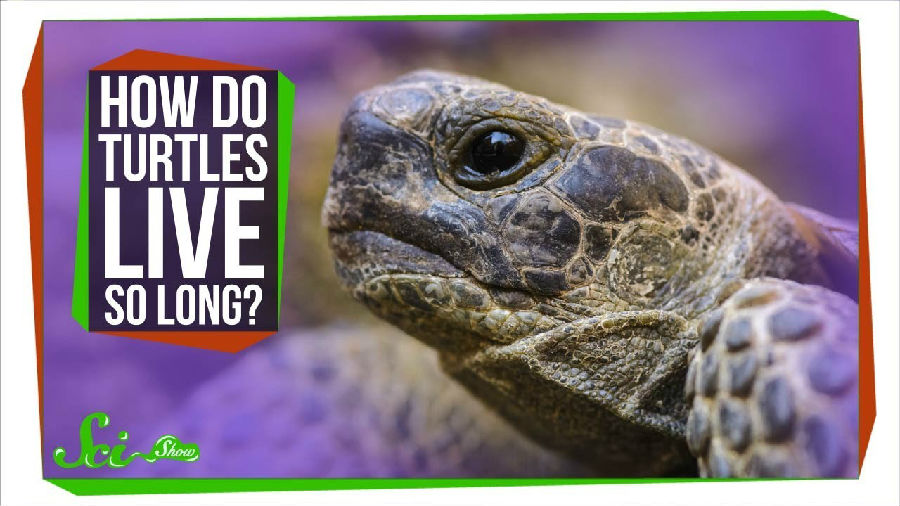Turtles live a ridiculously long time.
龟的寿命非常长。
The oldest known turtle—a Seychelles giant tortoise named Jonathan — is 186 years old and still kicking!
已知最长寿的龟—名为乔纳森的塞舌尔象龟—已经有186岁,如今依旧矫健!
Galapagos tortoises have produced healthy, viable young past their 80th birthday.
加拉巴哥岛龟在过完80岁大寿后,依然能够繁育健康的后代。
And even smaller species can live for half a century, as long as they aren't eaten or run over first.
即使是再小一点的龟也能活上半个世纪,只要它们不进食或是被撞倒。
Scientists aren't 100% sure how these animals live so long —
科学家们也不能百分百确定这类动物何为如此长寿—
but a lot of it seems to boil down to preventing wear and tear to the body.
但是似乎很大部分原因要归结于阻止身体的损耗。
In most species, including ours, the odds of dying go up as you get older.
大部分物种,包括人类,死亡的可能性随年龄增长而增加。
That's because our bodies just kind of deteriorate over time.
那是因为我们的身体随时间而消磨。
Like any machine, parts slowly wear down, and that eventually leads to some kind of catastrophic failure.
和任何机器一样,零件慢慢磨损,最终导致某种灾难性故障。
But that's not always the case in turtles — in some, being old means they're less likely to croak.
但是龟类并非如此—对它们而言,变老意味着它们无法发出呱呱叫声。
And they can even still have healthy offspring.
而且它们甚至依然可以繁育健康的后代。
This ability to stay alive and have healthy babies despite being old is called negligible senescence.
长寿和繁育健康后代的能力被称为可忽略的衰老。
And though some of the details are still unclear, it seems turtles pull this off thanks to a remarkable tolerance for oxidative stress.
虽然其中一些细节尚不清楚,但是似乎龟的这种能力是由于对氧化应激的显著容忍力。
That's the harm to cells that happens due to reactive oxygen species or ROS:
氧化应激是对细胞的伤害,在遇上活性氧(ROS)时就会发生:
a family of oxygen-containing compounds that really, really like interacting with other molecules.
ROS—含氧化合物家族,非常喜欢和其他分子相互作用。
The accumulation of this damage, especially to neurons and immune cells, is thought to drive aging.
这种伤害的积累会加速老化,尤其是对神经元细胞和免疫细胞的老化。
But reactive oxygen species aren't evil — they're produced all the time, like in the calorie-burning process that turns food into cellular fuel.
但是活性氧并非有害—它们一直繁育,就像是燃烧卡路里的过程一样,将食物转化成细胞燃料。
So the key is not getting rid of ROSs, but keeping them under control.
所以关键并不是摆脱ROSs,而是让它们处于控制之下。
One of the ways turtles do that is by producing less of them.
龟所使用的方法之一就是减少ROS的产生。
They have a slow metabolism, which means they need fewer calories than other animals of similar size.
它们的新陈代谢很慢,这意味着它们比其他同体积动物所需的卡路里更少。
It also helps that they're poikilothermic: their bodies can function at a wide range of temperatures.
还有一点,龟是冷血动物:它们的肢体可以在任何温度下正常工作。
So they're not as stressed by cold or hot temperatures as we are—and less stress means less ROS.
因此它们不像人类一样受寒冷或炎热温度的困扰—而压力小意味着更少的ROS。

They also have ways to manage the ROS they do produce.
它们还有其他方法能够管控自己产生的ROS。
Since these compounds can damage telomeres — the protective caps of DNA that shorten every time a cell divides —
由于这些化合物质可以对染色体终端造成伤害—DNA的保护帽,细胞每次分裂,保护帽就会缩短—
turtles produce lots of the enzyme telomerase, which helps prevent that shortening.
龟类能够产生很多端粒酶,帮助阻止这种缩短。
And that helps keep their cells healthier longer, lessening their odds of developing cancer or other diseases.
这也能帮助保持它们细胞更加健康长寿,减少它们患上癌症或其他疾病的可能。
They also make lots of strong antioxidants and other proteins that fight cellular damage.
它们还能产生很多强效抗氧化剂和其他蛋白质对抗细胞损害。
While these traits might seem like the perfect adaptations for a long and healthy life,
虽然这些特质似乎是健康长寿的完美适应,
biologists think they arose for another reason: surviving without oxygen.
但生物学家认为它们的出现存在其他原因:在无氧条件下生存。
Many turtles, including those cute red-eared sliders you might have seen in pet stores,
很多龟类,包括那些在宠物店里的可爱的红耳龟,
can go weeks without breathing air — a handy trick if you want to spend the winter in an icy pond.
可以在不呼吸氧气的情况下存活几周—这是一个非常便利的技巧,如果你想在结冰的池塘过冬的话。
They have special ways of keeping important tissues alive during that time, like shutting down oxygen-hungry neural circuits.
它们有在严酷温度下保持重要组织存活的特殊方法,比如关闭需要氧气的氧神经回路。
But they also have to deal with the burst of ROS production that happens when they finally come up for air and oxygen levels rapidly rise
但是当它们最终接触空气,氧气含量大幅上升时,还必须应对突然爆出的ROS
which is where those antioxidants and cell-healing proteins come into play.
这时那些抗氧化剂和细胞治愈蛋白质就该上场了。
So their longevity might be a happy side effect
因此它们的长寿或许只是一个幸福的副作用
— one that some researchers are hoping to translate into longer, perhaps even indefinite lives for people.
—一些科学家希望将这个副作用转化成人类的长寿,甚至永生。
But... we can't really replicate all of their tricks, like becoming poikilothermic.
但是...我们无法真的去复制它们所有的小把戏,比如变成冷血动物。
So while studying turtles may help us maintain fitness in later years,
因此,研究龟可能帮助我们在晚年保持健康,
if you're hoping they hold the secrets to immortality… well, I wouldn't hold your breath.
如果你希望他们掌握永生的秘密...嗯嗯,我是不会屏住你的呼吸的。
Thanks for asking! And thanks to our patrons on Patreon, who keep the answers to questions like this flowing.
感谢提问。感谢Patreon的赞助人,感谢你们一直的提问。
If you want to pose questions like this, help us decide which ones to answer,
如果你想向我们提问,帮助我们决定回答哪一个问题,
or just get some cool rewards that you can't get elsewhere, you can head on over to Patreon.com/SciShow to learn more.
或是想获得一些超酷的奖品,请登录Patreon.com/SciShow了解更多信息。











